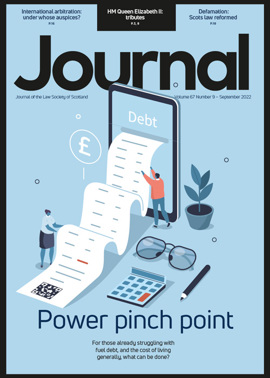Opinion: Gordon Dangerfield
The law on female single sex services is set out in the Equality Act 2010, which allows services to be exclusively single sex if this is a “proportionate means of achieving a legitimate aim”.
 Surprisingly, perhaps, there has been great controversy and uncertainty over what “sex” means in this context. In particular there has been a widely held view that trans-identified males are to be treated as female. This view is held by the Scottish Government, which insists that female single sex services are “trans inclusive” as a condition of granting funding to such services.
Surprisingly, perhaps, there has been great controversy and uncertainty over what “sex” means in this context. In particular there has been a widely held view that trans-identified males are to be treated as female. This view is held by the Scottish Government, which insists that female single sex services are “trans inclusive” as a condition of granting funding to such services.
A recent Inner House decision has now resolved this uncertainty in Scotland, and a very recent speech by the (then) Attorney General in England has confirmed that the UK Government believes it to be resolved for the whole of the UK.
In For Women Scotland v Lord Advocate and Scottish Ministers [2022] CSIH 4, Lady Dorrian, giving the opinion of the court, said: “The protected characteristics listed in the 2010 Act include ‘sex’… [A] reference to a person who has a protected characteristic of sex is a reference either to a man or to a woman. For this purpose a man is a male of any age; and a woman is a female of any age… Provisions in favour of women, in this context, by definition exclude those who are biologically male” (para 36).
For the purposes of the 2010 Act, then, “sex” means biological sex. If a provision is made in favour of the female sex, it is made in favour of those who are biologically female, and it excludes those who are biologically male.
The court then considered the question of whether the quite separate protected characteristic of “gender reassignment” in the Act had any bearing at all on the meaning of “sex”. Lady Dorrian made clear that none of the authorities put before the court constituted “authority for the proposition that a transgender person possesses the protected characteristic of the sex in which they present”. These cases, she continued, “do not vouch the proposition that sex and gender reassignment are to be conflated or combined” (para 38).
Thus, if a biological male is undergoing what we call “male to female” gender reassignment, that process will give them the protected characteristic of “gender reassignment” under the Act. It will, however, have no effect at all on their sex for any of the purposes of the Act. Their sex, for any of these purposes, will remain male.
This authoritative statement on the application of the UK-wide Equality Act in Scotland is wholly in line with the approach set out very recently by Attorney General Suella Braverman QC. Speaking specifically of schools, but in terms which apply equally to services, she said: “The exceptions in [the Act] create a mechanism whose sole purpose is to ensure that even though there is a general prohibition of sex discrimination, [services] are legally permitted to take a single sex approach… Parliament could not have plausibly intended for these specific exceptions to be subject to collateral challenge by way of complaints of indirect discrimination by other protected groups such as those with reassigned gender. This would be to risk the Equality Act giving with one hand, and promptly taking away with the other.”
It is precisely on this basis that, as the Attorney General pointed out, the exceptions in the Act which allow for single sex services “permit direct discrimination on grounds of sex: they permit ‘women only’ and ‘men only’ services, provided that the rule is a proportionate means of achieving a legitimate aim”.
It follows, then, that “it is not possible to admit a biological male to a single-sex service for women without destroying its intrinsic nature as such: once there are [biological males] using it, however they define themselves personally, it becomes mixed sex”.
In other words, single sex services are an all-or-nothing package. It’s either proportionate and legitimate to have a female single sex service or it isn’t.
The moment you say that it’s not proportionate or legitimate to exclude even one solitary biological male from your single sex service, then at that exact moment your service ceases to be a single sex service, and you lose your whole justification for excluding any male from that service. When you admit a biological male to what was a female single sex service, you are admitting in terms that you no longer have legal justification for your single sex service. You are now a mixed sex service.
That is what having a female single sex service is. The clue is in the name.
The Scottish Government, among others, would do well now to pay heed to that simple message.
Regulars
Perspectives
Features
Briefings
- Civil court: Pointers to the future
- Intellectual property: Data mining for all
- Agriculture: The next land reform package
- Corporate: Developments and divergence in data
- Sport: Lessons from the Whyte review
- Scottish Solicitors' Discipline Tribunal
- Property: Registration – over a decade?
- In-house: The top team – three more years






